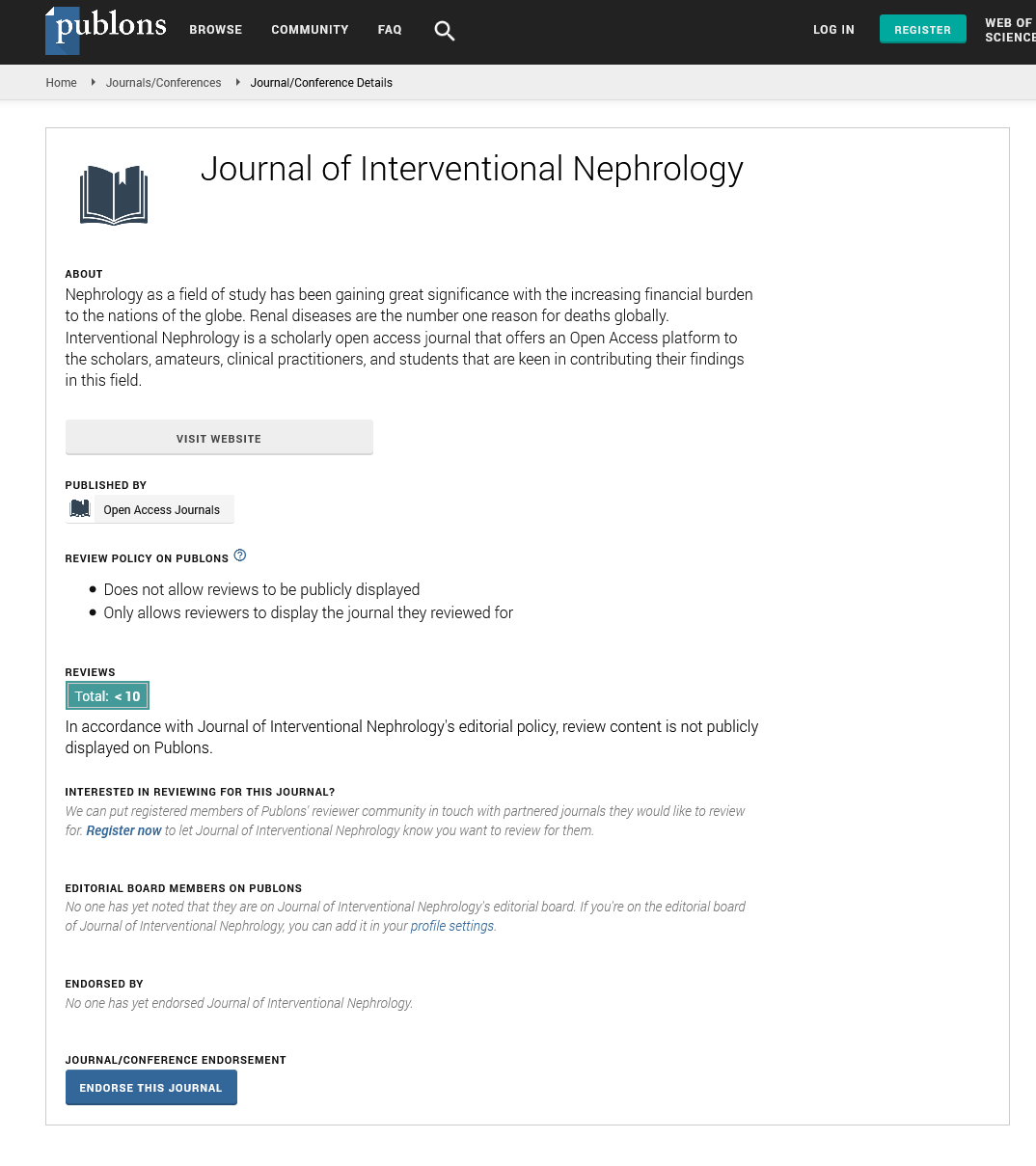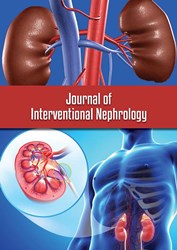Perspective - Journal of Interventional Nephrology (2023) Volume 6, Issue 5
A Brief Note on Kidney Transplant
- Corresponding Author:
- Barsasella Diana
Department of Urology, Oglethorpe University, Taiwan, Province of China
E-mail: diana.basasella@gmail.com
Received: 01-Sep-2023, Manuscript No. OAIN-23-118352; Editor assigned: 04-Sep-2023, PreQC No. OAIN-23-118352 (PQ); Reviewed: 18-Sep-2023, QC No. OAIN-23-118352; Revised: 25-Sep-2023, Manuscript No. OAIN-23-118352 (R); Published: 05-Oct-2023, DOI: 10.47532/oain.2023.6(5).173-174
Introduction
A kidney relocate is a medical procedure done to supplant an unhealthy kidney with a solid kidney from a contributor. The kidney might come from a departed organ contributor or from a living giver. Relatives or other people who are a decent match might have the option to give one of their kidneys. This sort of relocate is known as a living transfer. Individuals who give a kidney can carry on with sound lives with one solid kidney.
An individual getting a transfer most frequently gets only 1 kidney. In uncommon circumstances, the person might get 2 kidneys from a departed giver. The sick kidneys are generally left set up. The relocated kidney is put in the lower tummy on the front side of the body.
Description
You might require a kidney relocate in the event that you have end stage renal sickness (ESRD). This is a long-lasting state of kidney disappointment. It frequently needs dialysis. This is a cycle used to eliminate squanders and different substances from the blood.
The kidneys:
• Eliminate urea and fluid waste from the
blood as pee. Urea is made while food
varieties containing protein, like meat,
poultry, and certain vegetables, are
separated in the body. Urea is conveyed in
the blood to the kidneys.
• Balance salts, electrolytes, like potassium
and sodium, and different substances in
the blood.
• Produce erythropoietin, a chemical that
helps the development of red platelets.
• Manage pulse.
• Manage liquid and corrosive base
equilibrium in the body to keep it
unbiased. This is required for typical
capability of many cycles inside the body.
A few states of the kidneys that might bring about ESRD include:
• Rehashed urinary diseases.
• Kidney disappointment brought about by
diabetes or hypertension.
• Polycystic kidney illness or other acquired
messes.
• Glomerulonephritis, which is aggravation
of the kidney’s sifting units.
• Hemolytic uremic condition, an
interesting issue that causes kidney
disappointment.
• Lupus and different sicknesses of the safe
framework.
• Checks.
Different circumstances, like innate imperfections of the kidneys, may bring about the requirement for a kidney relocate.
There might be different purposes behind your medical care supplier to suggest a kidney relocate.
Likewise with any medical procedure, complexities can happen. A few complexities might include:
• Dying
• Disease
• Blockage of the veins to the new kidney.
• Spillage of pee or blockage of pee in the
ureter.
• Absence of capability of the new kidney right away.
The new kidney might be dismissed. Dismissal is a typical response of the body to an unfamiliar item or tissue. At the point when another kidney is relocated into a beneficiary’s body, the safe framework responds to its thought process as a danger and assaults the new organ. For a relocated organ to get by, medications should be taken to fool the resistant framework into tolerating the transfer and not going after it as an unfamiliar item.
The medications used to forestall or treat dismissal make side impacts. The specific secondary effects will rely upon the particular meds that are taken.
Not every person is a possibility for kidney transplantation. You may not be qualified in the event that you have:
• Current or repeating disease that can’t be
dealt with really.
• Disease that has spread from its unique area
to somewhere else in the body.
• Serious heart or other medical conditions
that make it risky to have a medical
procedure.
• Difficult circumstances other than kidney
infection that could get worse after
transplantation.
• Neglecting to follow the treatment plan.
There might be different dangers relying upon your particular ailment. Make certain to examine any worries with your transfer group before the strategy.
To get a kidney from an organ giver who has passed on (dead body), you should be put standing by of the Unified Organization for Organ Sharing (UNOS). Broad testing should be finished before you can be put on the transfer list.
Conclusion
A transfer group does the assessment cycle for a kidney. The group incorporates a transfer specialist, a transfer nephrologist (medical services supplier gaining practical experience in the therapy of the kidneys), at least one transfer nurture, a social laborer, and a specialist or clinician. Other colleagues might incorporate a dietitian, a cleric, or potentially an anesthesiologist.
The assessment incorporates:
Emotional well-being assessment: Mental and social issues engaged with organ transplantation, like pressure, monetary issues, and backing by family or potentially life partners are evaluated. These issues can incredibly influence the result of a transfer. A similar sort of assessment is finished professionally giver.
Blood tests: Blood tests are finished to assist with finding a decent contributor match, to check your need on the giver list, and to assist the possibilities that the contributor organ with willing not be dismissed.
Symptomatic tests: Symptomatic tests might be finished to actually look at your kidneys as well as your general wellbeing status. These tests might incorporate X-beams, ultrasound, kidney biopsy, and dental tests. Ladies might get a Pap test, gynecology assessment, and a mammogram.


